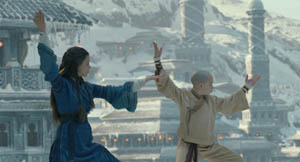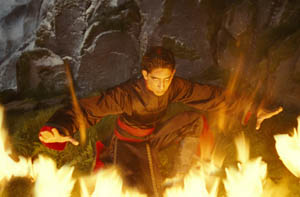|
Okay, let's just make it official. M. Night Shyamalan might just be the biggest filmmaking disappointment in the art's relatively short history. In under ten years, the fact of this man's name being attached to a project has gone from eliciting anticipation to dread in potential audiences. In spite of this much-noted fact, he was handed a 150,000,000 dollar prestige project and proceeded to drop the ball straight into the Earth's molten core. Despite a marked dissimilarity in scale with his previous projects, The Last Airbender, far from reinvigorating his slumping oeuvre, may well be his worst film yet, and considering the stinkers he's made recently, that's saying a lot-all of it bad. 
This was based on a cartoon, which I've never seen. Actual Japanese animation had gotten boring enough; the thought of tuning in to some imitation anime sounded to me about as desirable as dental surgery performed with a nail gun. Its adherents, however, all seem quite adamant that the cartoon was better, and I'm inclined to believe them. Any cartoon as bad or worse than this film would never have spawned a big-budget adaptation to begin with. Maybe this muddle makes sense when developed over a longer period of time (and with some better pacing and structure and just about everything else, as a longer cut of this film strikes me as frankly unbearable). What I could glean of the story is as follows: the world is divided into four nations based on the ancient so-called "elements" of earth air, fire and water. A young girl and her older brother from the Water Nation, about five minutes into the film, find a child frozen in the ice, and believe him to be the Avatar, a Dalai Lama-inspired character who is supposed to rule over all four nations with peace and wisdom, etc., via his ability to control all four mystical elements. There's very little doubt about this at any point in the movie; little Aang is quite obviously the Avatar virtually from the beginning, and no time is spent on developing any sense of mystery or wonder. Soon, the Fire Nation arrives (and they've brought their machines, as we're repeatedly reminded) to kidnap Aang and perform random acts of dickheadishness, because they're the villains. Why? Because they control fire, of course. What other reason do we need? Actual motivation? Reasons? Pshaw. Beyond this, we learn next to nothing about any of these nations, beyond their abilities to telekenetically manipulate their namesake elements, which we learn in the opening narration. Otherwise, they all seem like decent guys who keep getting pestered by the Fire Nation and their habitually-brought machines. I'm not even sure what machines they mean, other than the diesel-powered ships in which they travel, in which case it would be a little difficult for them to show up anywhere without bringing their machines. (One might picture a scene from Easy Rider wherein frightened pedestrians call out, "It's that motorcycle gang again! And they've brought their motorcycles!") The entire story is an incoherent mess. The Avatar keeps getting captured, and keeps escaping. The prince of the Fire Nation seems to keep defecting, and then un-defecting. The older brother character from the beginning falls in love with a white-haired princess, which happens entirely off-screen and is merely related by his sister's sporadic narration. The princess was once saved by a magic fish, and consequently can save said fish when it's evilly murdered by one of the Fire Nation assholes. About five whole minutes after it's murdered. This might have been in any way poignant if we knew a single goddamned thing about the princess, the fish, or anyone else, for that matter. You may notice I've hardly used any of the characters' names. I'm not altogether certain I ever heard them, or learned anything about them as individuals. The actors themselves don't seem to have fared much better. Everyone recites dialogue, particularly expository dialogue, as if they've simply been told to say it, rather than as if it's something they actually know and live with regularly. The whole movie feels like someone filmed a rough synopsis rather than an actual script. 
With typically brainless adventure films, the action is often the only saving grace, and this is the film's worst blunder: it utterly fails at being the kind of film it's aiming to be. Like a comedy with no jokes, The Last Airbender is an epic adventure that is drop-dead boring. When Aang is first captured, there is a rather bewildering scene wherein he implores the other prisoners, "Hey! You guys have superpowers. Why not use them to, you know, fight back?" Apparently having never thought of this brilliant notion themselves, they proceed to engage their captors in what is probably the most torpid martial arts scene I've ever witnessed. Aang and the other captives gesticulate and strike poses to summon their elemental powers in rituals so lengthy that enemy archers could stick fifty arrows in them before they were finished. Slow motion is frequently interrupted by slower motion, as Shyamalan apes the Zack Snyder/McG speed-shuttling trick, which I've never especially cared for, to lame effect. Rather than play to his actual directorial strengths-and he does have them-Night has picked a project whose needs he simply doesn't understand, and is obviously directing the action the way he thinks action is supposed to look nowadays, with absolutely no instinct for it. The film is fatally anticlimactic. When Star Wars was just starting out, Lucas had the wit to make the first film a stand-alone adventure, just to be safe. Shyamalan gives us a story with a truly feeble catharsis and leaves the end wide open for a sequel which not only will likely never come, but doesn't deserve to. Much whinging has occurred over the casting of mostly white actors in ostensibly Asian roles. Personally, I find the casting of a white kid as a character originally invented by two white guys, drawn (as per most anime) to look like a white kid in Asian clothes, and voice acted by a white kid to be a rather bogus issue. The casting of a bad actor is frankly far more irritating. Perhaps the director saw the writing on the wall early on, and deliberately manufactured a controversy to distract potential audiences from his complete and total incompetence in all of the areas that actually mattered. Sharp-eyed viewers might catch a scene blatantly ripped off from Serenity. By "sharp-eyed viewers," I mean anyone who's ever seen Serenity even once. -review by Matt Murray
|
|
||||||||